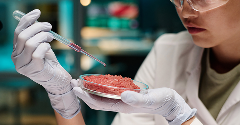News
Culture and innovation converge to unlock India’s nutraceutical potential
5 Nov 2024The potential of India’s nutraceutical market is being realised, driven by innovative breakthroughs and increased dietary education among the country’s 1.5 billion inhabitants.

Those were the conclusions drawn in a white paper commissioned by the Associated Chambers of Commerce and Industry of India (ASSOCHAM). The authors suggested that growth in India’s burgeoning nutraceutical market – which has an estimated value of $4 billion (€3.6 billion) and a compound annual growth rate (CAGR) of 14.2% – is being driven by increased awareness of health issues and prevalent micronutrient deficiencies.
“As we aim to become the third-largest economy in the world by 2030, addressing nutritional challenges will be crucial – not only for the country’s future growth and prosperity, but also to improve the general quality of life for all of us,” said Sandeep Verma, country head of the Consumer Health Division at Bayer India, which featured in the report.
“In this context, it is important for us to note that while a good, balanced diet has to be the foundation for good nutrition, just on its own, it may not give us 100% nutrition. The role of micronutrient supplements is essential to acknowledge as being critical to take us to that milestone… We seek to be one nation with 100% nutrition for all.”
Rising interest in nutraceuticals to ward off age-related ailments
The report, which was authored by management consulting firm TechSci Research, identifies the use of nutraceuticals to prevent ill health by supporting immunity and overall wellbeing.
It shines a spotlight on heightened interest in essential vitamins such as A, C, D, and folate, and minerals like selenium and zinc, to boost immunity.
Nutraceuticals devoid of additives and artificial agents are preferred by consumers, the authors added, explaining that this was prompting the industry to integrate science and healthy food for public health benefits.
“Global leaders such as MyHealth, Kamedis, Kreivo Health, and Baker Dillon Group are seeking collaborations and investments with Indian companies specialising in wellness and dietary supplements,” said Karan Chechi, CEO and founder of TechSci Research.
“The pandemic has highlighted the importance of immunity boosters and natural foods. India offers opportunities for various forms of nutraceutical delivery, including liquids, capsules, tablets, or chewable gummies.”
India’s fast-moving healthcare goods sector: Functional foods and supplements
India’s fast-moving healthcare goods sector captures 1 to 2% of the global market share, with functional foods making up 60% of the market and dietary supplements 40%, according to the report.
Companies like Abbott and Nutrilitius are innovating to address nutritional deficiencies and promote health, launching products like PediaSure and Nutraceuticals Capsules respectively. These companies also emphasise their products’ affordability and quality through certifications like FDA, Non-GMO, Made in India, and Startup India, the white paper added.
The shift towards natural extracts was particularly noticeable during the pandemic, when there was an emphasis on herbs and plants to bolster immunity. This led to a surge in demand for Ayurvedic innovations, where India’s nutraceutical market has witnessed notable growth since 2020, with products like ashwagandha and herbal kaadha gaining in popularity, the report added.
One such example occurred in 2021, when Bio-Botanica introduced Ashwagandha 5404ST, a herbal supplement aimed at improving skin health, mental wellbeing, and immune function.
In the same year, Amway launched Chyawanprash by Nutrilite, a preservative-free blend of 32 herbs designed to boost immunity, rejuvenate the body, increase strength, and endurance.
“[Regarding the] current situation and post Covid-19, we will see a huge surge in demand and an extreme challenge with supply chain,” said Dr Amit Chandra, scientist and fellow for botanical innovation and strategy at Amway R&D.
“Also, the way the global weather is changing, we will also see a challenge in the yield of beneficial phytochemicals from plants when grown naturally.
“Consumer desire to see and/or experience health benefits faster and instantly is another challenge with botanical-based nutraceuticals.”
Immune system support: A holistic measure to address ill health
Other country-specific market drivers discussed in the report include the rising incidence of chronic diseases, made more urgent by India’s ageing population.
The authors concluded that increasing prevalence of geriatric populations, lifestyle changes, and rising chronic diseases were spurring interest in nutraceuticals, particularly those aimed at lowering low cholesterol and weight management.
“Antioxidant supplements like vitamins C and E help combat oxidative stress and reduce the risk of chronic diseases such as cancer and cardiovascular diseases,” said Deepak Sood, secretary general at ASSOCHAM.
“Certain demographic groups, such as the elderly, have unique nutritional requirements. Nutraceuticals and dietary supplements tailored to these populations help address specific needs and support optimal health outcomes.
“For instance, calcium and vitamin D supplements are often prescribed to older adults to support bone health and reduce the risk of fractures.”
Related news

Future F&B flavours favour exploration and explosive taste profiles
25 Mar 2025
Exploration and experimentation will define the future of flavour, according to Mintel, as consumers seek out taste profiles and textures that offer an adventurous eating experience.
Read more
Partnership plans to scale cultivated meat production
21 Mar 2025
Food technology innovator Ever After Foods (EAF) and multinational food leader Bühler are striving to overcome hurdles to access and accelerate the development of cultivated meat.
Read more
Global consumers enjoy food less and perceive it as less healthy
20 Mar 2025
Enjoyment of food and its perceived healthiness is dwindling among most global populations, according to findings from Gallup and Ando Foundation/Nissin Food Products.
Read more
Seafood set to ‘dethrone’ poultry as protein growth king
19 Mar 2025
Seafood is poised to surpass poultry as the leading contributor to global protein supply growth this year, according to Rabobank’s latest protein outlook.
Read more
Tariff volatility leaves food manufacturers in limbo
11 Mar 2025
Rapid US trade policy shifts and tariff escalations are creating uncertainty for food manufacturers and ingredient suppliers.
Read more
F&B industry hit with fresh greenwashing claims
26 Feb 2025
The food and beverage (F&B) industry is under fresh scrutiny amid claims of greenwashing, with Arla the latest company in the firing line.
Read more
Protein diversification: A massive missed market?
20 Feb 2025
Germany and the UK could be missing out on the massive market for alternative meats and proteins, with one new coalition calling for an end to the “steak-tofu struggle”.
Read more
Have scientists discovered a new tool to measure UPFs?
19 Feb 2025
Researchers have developed a new scoring system and database, compiling over 50,000 food items, of which over 1,000 are classified as ultra-processed.
Read more
China ramps up cultivated meat research with new innovation base
18 Feb 2025
China has opened its first fermentation and cultivated meat research centre in Beijing.
Read more
Most consumers lack trust in AI, but supplement users are ready to embrace the technology
14 Feb 2025
A survey of UK and US consumers found that most supplement users are willing to let AI make decisions on their behalf, but they also demand greater transparency.
Read more